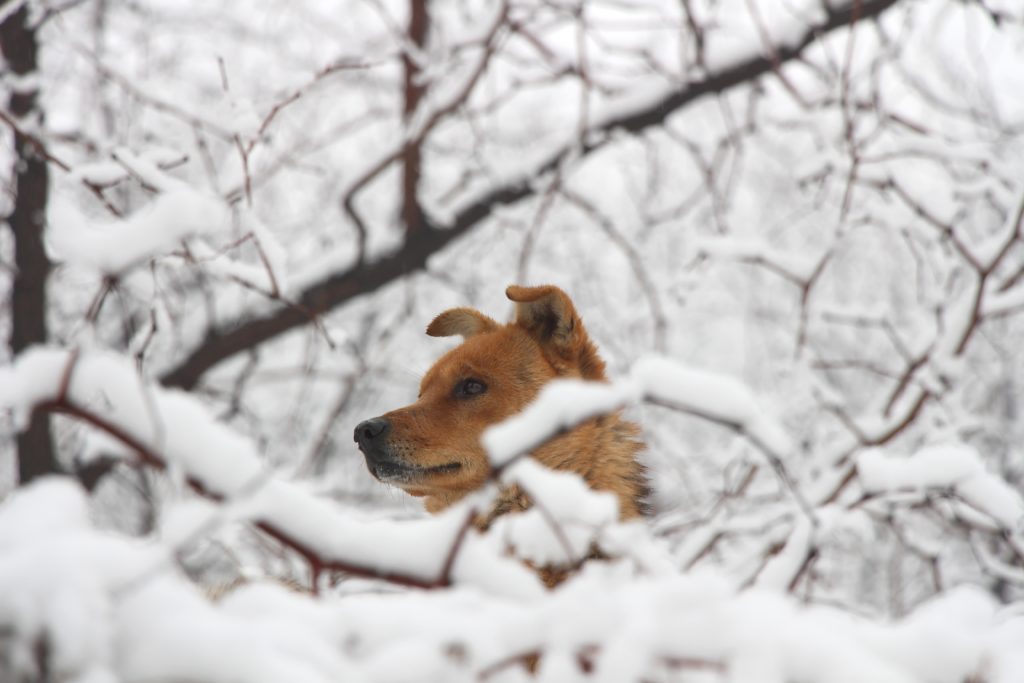Is Your Dog Sneezing and Coughing this Winter?
Share
[Sassy_Social_Share]Winter is when humans tend to get sick with all sorts of colds and coughs, but what about our dogs? Do they get winter colds? Could they catch a cold from us? Thankfully, humans and canines are affected by different strains of viruses, so we generally don’t pass colds between species. But dogs can and do get colds. Like us, this mostly means a short period of feeling poorly before the immune system manages to overcome the virus.
But if your dog is sneezing or coughing, and it persists, it might be something more serious. Dogs are incredibly stoic. They don’t get ‘man flu’! They will soldier on even when feeling unwell. But sneezing and coughing should get our attention. While sneezing is often due to an irritant such as dust, pollen or fragrances, coughing can be more serious.
When It’s More than Just a Cough
Coughing can be a sign of a serious illness in dogs, and should never be ignored. If your dog has a persistent cough, you should bring it to the vet for a complete assessment. There is a possibility that it could be one of these serious illnesses.
- Kennel Cough – This is a viral illness named for the fact that it can (and does) spread quickly in kennels and other situations where many dogs have contact with each other. It can look very like a cold with a persistent cough, runny nose and sneezing. Dogs with mild cases of kennel cough often remain active, but severe cases can cause lethargy. While it may look like just a cold, it is a serious illness that can lead to pneumonia or even death if left untreated.
- Heart Disease – A cough that persists for more than a few days can indicate heart disease. Overweight dogs and larger breeds are more susceptible. Chocolate damages dogs’ hearts. Chocolate poisoning can kill, and a dog that survives it – including a dog that regularly consumes very small amounts of chocolate and shows no immediate ill effect – can suffer damage to the heart. Other symptoms include shortness of breath, lethargy, decreased appetite, bloating and swollen limbs.
- Parasites (Heartworm and Roundworm) – Not surprisingly, heartworms damage the heart and cause the same symptoms as heart disease, including a persistent cough and lethargy. Roundworms can infest a dog’s lungs, causing coughing. They also cause digestive problems including colic, vomiting and changes in bowel habits.
These are three good reasons to get your dog to the vet if they are coughing for more than a few days. What looks like a cold could be something more serious. And if it is, treating it sooner gives your dog a greater chance of making a strong recovery.

Preventing Canine Illness
We can use two tactics to minimize the risk of our dogs developing viral illnesses or parasites. And we don’t have to do anything extreme, complicated or terribly expensive.
Firstly, we can protect them from exposure. When you are out walking your dog, don’t let him interact with strays or loose dogs. Know that while off lead dog parks are a great place for your dog to exercise, they do have some risks. If your dog is senior or unwell, avoid off lead dog parks or go at times when you are confident not many others will be there.
Every pet should have routine vaccinations to protect them from diseases, but did you know that kennel cough is a separate vaccination? It is given by nose, not by jab. Not all vets offer it routinely, so you have to ask about it. Good kennels will require proof that your dog has a current kennel cough vaccine. You can also protect your pet from parasites, and you can choose between treatments you can get at the grocery store and those your vet sells.
Secondly, we can take steps to build their immune system. A healthy diet is the foundation of a healthy immune system for dogs just as it is for us. But dogs have different nutritional needs. A diet rich in omega 3 oils and antioxidants will boost a dog’s immunity, which is one reason many dog lovers love the Connolly’s RED MILLS Leader range of dog food. Leader features linseeds as a source of omega 3 oils. It also includes beetroot, rosemary, seaweed and cranberries to provide the antioxidants dogs need to stay healthy. Connolly’s RED MILLS Engage range is formulated for hard working dogs who put great demands on their bodies. Dogs that are outside working in damp weather or retrieving game from water can run down their immune systems if they aren’t on a diet designed to support their extra nutritional needs. The Engage line of dog food includes extra vitamins and minerals as well as plenty of omega 3 and omega 6 oils and antioxidants.
Feeding a healthy diet and giving your dog regular exercise will help keep their immune system strong. If she does encounter a virus, she’ll be better able to fight it off. And keeping them healthy and active also reduces their risk of heart disease. Dogs don’t like to let us know when they are sick. Their instinct is to dismiss any type of pain or weakness. That goes back to their ancestors who hunted in packs. A weak pack member would hurt the whole pack’s chance of catching food, so the pack would drive out the weaker members. Even the most docile lapdog still has a touch of that instinct, so it is up to us to be proactive in caring for their health and protecting them from disease.





